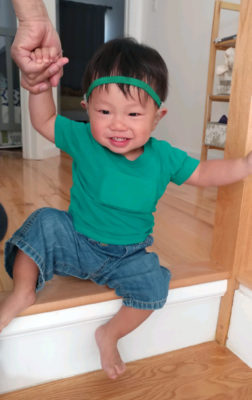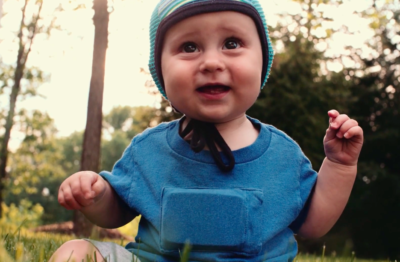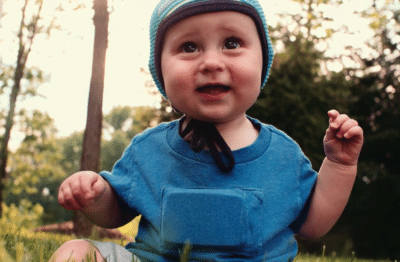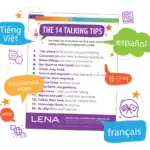
Sound Start Babies, a nonprofit organization based in New Jersey, provides home and center-based early intervention services for children with hearing loss.
Their team’s parent-coaching program, The COMPASS Project, uses LENA SP to provide feedback to parents on how much language their children experience during the day, informing targeted coaching around areas for growth.
LENA SP provides richly detailed information about a child’s audio environment, measuring the amount of adult words, conversational turns, overlapping sounds, and electronic noise.
Understanding this information is particularly important for families with children who are hard of hearing, as these children are at a higher risk for developmental delays if they do not receive ample language input during the critical first three years of life.
That’s where LENA comes in. Using a small recording device and an advanced audio processing engine, LENA’s “talk pedometer” technology quantifies exactly how much language children are experiencing, and more important, responding to.
“The measures of adult words and conversational turns are kind of abstract, and they’re hard to quantify unless you actually have something doing the math for you,” Kayley Mayer, The COMPASS Project coordinator and teacher of the deaf explained. “Parents are pretty excited that there’s something that can give them this type of information — they thought it wasn’t possible to know.”
After getting a baseline measurement, parents discuss the LENA feedback reports with coaches during home visiting sessions.

“We’re able to give each family a goal that’s tailored specifically to their LENA report,” Mayer said. “It’s really individualized, and families feel like they can target something specific.”
For example, if the report shows low adult word counts, the coach will provide the parent with a tip sheet on how to incorporate more language into daily routines. After the next recording, they can look at the reports together and see how the parent is doing.
“Parents like that they can see their progress over time. The reports help them to get a visual of what their day is like, see times when language is high, and what their child’s audio environment is like in a way they wouldn’t have had otherwise,” Mayer said.
One key metric that coaches focus on is the amount of noise that overlaps with child-directed speech.
“You could be talking a lot as a parent, but if there’s too much competing noise, what you’re saying isn’t salient,” Mayer said. “We always try to target the audio environment first, because improving that piece tends to have a domino effect on the other measures.”
Seeing the amount of TV/electronic noise during the day — which often corresponds to low adult word count or low child vocalizations — demonstrates to parents the importance of turning off electronic devices. The reports also help the coach to understand what’s happening in the home beyond what they can observe during an hour-long visit, facilitating more meaningful coaching sessions.
[quote]
“We’re looking for a sustainable change,” Mayer said.
To evaluate how effective The COMPASS Project is, she looks at the change between the first and last recordings a family makes. To date, families who participated in the program on average increased adult word counts by 65 percent, child vocalizations by 70 percent, and conversational turns by 83 percent.
The data and feedback provided by LENA helps to effect a change in parents’ behavior, while also easing their concerns about their child’s development.
“Parents of kids who are DHH are always wondering how their kids are stacking up to typically developing children, and the percentiles and Snapshot are really helpful for that,” Mayer said.
On several areas of the LENA SP reports, a child’s data is shown in comparison to a group of similarly aged, typically hearing children. For example, the reports include an AVA (Automatic Vocalization Assessment) score, which is a unique measure of the similarity of a child’s patterns of vocalizing to those of a reference sample.
Learn more about LENA SP by watching a quick webinar.
LENA SP is the most data-rich option of the LENA solutions for professionals who need detailed, scientifically reliable speech and audio environment data for children 2 months to 48 months old.
“The reports in LENA SP are even more parent friendly than they were in LENA Pro. They can see the AVA score right on their report and see how that connects with vocal productivity. The fact that the Developmental Snapshot score is right there is helpful, too,” Mayer said.
LENA’s vocal productivity measure estimates the length of child utterances within conversations. This measure — which is new in LENA SP — is LENA’s automated proxy for mean length of utterance (MLU), a well-established estimate used by professionals to gauge language development.
Parents also see stars on their reports when they have met goals, another visual cue that they’re increasing interactive talk in their home.
“A lot of parents are pretty tech-savvy — they have an app for everything — or they’ve already mastered their child’s assistive listening technology, so they’re pretty excited that there’s something that can give them this type of information,” Mayer said.
Click here to download a printable version of this story!
[about]




